Do You Have an Irrational Fear of Terrorism?
If yes don't forget to be afraid of your bathtub too
Note : After the 14-part series in which we looked at how nation-states are being disrupted by the Internet and globalization, and a 4-part series on why now is the worst time for them, I have concluded that there are two main ways for governments to respond to these disruptions:
Increasingly control what their residents do, via permanent digital surveillance and the use of AI and machine learning (China's way)
Accept that their role will diminish and treat their residents more like customers
In this new series, corresponding to chapter 4 of my forthcoming book, we analyze the (very) slippery slope towards generalized surveillance to which many countries, including the most democratic, are committing themselves.
Here are the 11 articles of the series :
I remember, when I was living in London, that an acquaintance of mine sent me this message in essence:
"Olivier, did you see what happened? I don't dare go out anymore, it's serious!"
Which triggered this dialogue :
"What happened? You mean the knife attacks1 ?
Yes, I'm afraid for my children!
But I don't understand, why are you afraid?
Well, let them be attacked, let something happen to them!
Have you seen the stats on terrorist attacks? You know you're more likely to be crushed to death by your fridge? Your kids are safe. If you're not afraid to let them walk down the street alone, then it's okay: they run more risks just walking around :)
(After a while) Oh no, I didn't realize! It's ok then! I'm not afraid of my fridge lol!"
Because you only have to look at the figures to see that, even in the worst years, terrorism causes very, very few deaths worldwide, or even in a single country.
Does terrorism account for a significant proportion of deaths worldwide?
In 2019, there were 20,000 deaths worldwide due to terrorism, which is close to the 2009 to 2019 average of 24,000 deaths per year, with the bulk of attacks taking place in South Asia, the Middle East and Africa2 .
This represented 0.05% of deaths worldwide.
Look at this diagram showing the main causes of death. Can you see the terrorism box?
To put things in context, on average you have :
660 times more likely to die of a heart attack
360 times more likely to die of cancer
78 times more likely to die from a neurodegenerative disease like Alzheimer's
62 times more likely to die from a domestic accident (such as being crushed by your fridge)
46 times more likely to die in a transport accident, such as a car crash
Look at the percentage of deaths caused by the 2001 terrorist attacks in the United States:
Yes, the worst terrorist attack in history caused 0.13% of deaths in the USA in 2001.
And by the way, it's not the worst attack in history as a proportion of the population: see the peak in Canada in 1985, which caused 0.18% of its deaths?
It was a bomb planted on Air India 182 by Sikh terrorists, which exploded in mid-flight, killing 329 people, most of them Canadians and British, although the terrorists' main aim was to kill Indians3 .
More Canadians (as a percentage of the population) died in this attack than in the September 11 attacks in the USA.
Yet did Canada embark on a "war on terror", passed freedom-destroying laws, began monitoring everyone's financial transactions, and sent its armed forces to fight Sikh terrorists around the world?
Not really, no.
You can also see that in the 6 Western countries most affected by terrorism, apart from the two attacks just mentioned, the worst attacks never exceeded 0.06% of deaths in any one year.
Between 2002 and 2018, six people died every year in the USA at the hands of Islamic terrorists, an annual death rate of around one in 50 million4 .
Also, take a look at these figures for the number of deaths caused by terrorist attacks worldwide, from 1970 to 20215 :
As you can see, the death toll from the worst attack in history in 2001 is barely visible. Why? Because most of the victims are, once again, in Africa, the Middle East and Southeast Asia6 and are, moreover, Muslim7 .
And the increase in the number of victims of terrorism in the 2010s is directly caused by the Islamic State, whose creation was directly caused by the second Iraq war, caused by the 2001 attacks and the excessiveness of the American response8 .
Are you irrational?
So the numbers are clear: if you're more afraid of a terrorist attack than a road accident, you are showing an irrational mind and/or that you are uneducated on the subject.
And the problem, of course, is that the majority of the population is like that, well helped, it has to be said, by journalists who can't help amplifying these facts, which remain anecdotal on the scale of society, and politicians who never let a crisis go to waste and take advantage of it every time to extend the powers of the government, even when it's no use fighting terrorism, as we've seen.
Take, for example, the percentage of Americans who are afraid to do something for fear of terrorism:
So, just to be clear, in 2017:
46% said they were afraid to travel abroad
38% were afraid to go to events attended by thousands of people
32% were afraid to fly
26% were afraid of going into skyscrapers
Out of fear of a risk that caused less than 0.01% of American deaths in 2017... in fact, there were 98 people who died as a result of a terrorist attack in the USA this year, compared with 37,133 in car accidents, or 378 times as many!
So why aren't Americans 378 times more afraid of dying in a car accident?
And it's not just Americans, judge for yourself with these figures9 :
Data from deaths due to road accidents 10 and percentage adults who drive in each country : US 87%11, Germany 80%12, Australia 70%13 and UK 87%14.
And other countries, for which I couldn't find the percentage of adults who drive, but which must be a similar figure to those above:
In fact, the number of additional deaths due to Americans choosing to travel by car rather than by plane15 following the September 11th attacks is estimated at 2,300 between 2002 and 200816 , i.e. 77% more deaths in 8 years than the initial victims of the attack.
This blatant and massive irrationality is one of the worst failures of modern society.
It has been calculated that the deaths of people in their bathtubs cost society more directly than terrorist attacks17 , and that only disproportionate reactions to these attacks increase this cost.
Politicians who take advantage of terrorist attacks to pass freedom-destroying laws, and journalists who go the extra mile to generate more clicks and sell more advertising, are part of the problem rather than the solution. Just like normal people who, having seen the figures shared above, continue to be more afraid of being attacked than of driving.
Remember this: terrorists are weak. Infinitely weaker than the targets they aim at, to the point where it's absolutely impossible for them to cause significant material damage, because even the worst attack causes nothing in the way of material and human destruction compared to a few days of high-intensity war18 like the one we saw between Russia and Ukraine19 . That's why they have to rely on asymmetrical results.
And asymmetrical results require a disproportionate response from the target government and its population.
Every time someone does it, every time you do it, it's a victory for the terrorists, and another reason for future terrorists to carry out new attacks.
How to stop terrorists from winning
So remember this:
Terrorists seek to trigger an asymmetrical response from their targets.
They also seek to corrupt their target's core values by making them react in a way that makes them contradict those values.
The only way for a state to really lose out in the face of a terrorist attack is to react disproportionately, both in the violence and cost of its response, and in the freedom-destroying laws passed in the heat of the moment.
An analysis of the laws passed in the wake of the September 11th attack clearly shows that these liberticidal measures are ineffective, such as the authorization of torture, which didn't lead to any interesting information, mass surveillance, which had similar results as we saw above, and financial mass surveillance, which also has catastrophic results as we'll see in detail shortly.
So understand that every time a state victim of a terrorist attack reacts disproportionately and passes freedom-destroying laws, it allows the terrorists to win.
To say this is not to set aside the horror of these attacks, nor to lack empathy for the victims. On the contrary, it means respecting the memory of the victims by ensuring that the terrorists who attacked them do not achieve their goals.
And this applies as much to the way we react to attacks as to the way we prevent them.
And so far, it has to be said, terrorists have won far more often than they have lost against democratic states.
So what should the American government have done?
It's obviously easy to reason after the fact, but that's precisely what hindsight and experience allow: it's now clear that the US government should have had a much more measured response than it did.
In particular :
Attacking Afghanistan for harboring and aiding Al Qaeda and Bin Laden, after the Taliban had refused to hand him over, was justified, but not necessarily necessary: the Taliban government had nothing to do with the attacks20 , other than providing a safe haven for Al Qaeda, and would probably have eventually bowed to international pressure to hand Bin Laden over to the USA. Or commando or selective operations against just Al Qaeda would probably have been possible. This would have avoided 20 years of war and $2,313 billion of expenditure21 to replace the Taliban with the Taliban.
No longer tolerating a state harboring and aiding terrorist organizations was and remains justified and necessary.
Reinforcing certain security measures at border controls, as well as airport and airplane security. However, it would have been necessary to carry out a rational cost/benefit analysis of these measures, which has not been done22 .
The imprisonments at Guantanamo should never have taken place, nor the torture and interrogation at CIA black sites. Every captured terrorist and enemy combatant should have been tried according to his or her status, in compliance with national and international laws.
To not do the 2nd war in Iraq. This war was unjust and unnecessary, its launch was based on lies and/or manifest errors, and ultimately led to the creation of the Islamic State, which sowed and still sows chaos: in 2022, it was still the deadliest terrorist organization on the planet. It has cost the United States at least $3,000 billion in direct and indirect costs23 , plus a huge soft power and opportunity cost.
Not to have implemented a generalized financial surveillance regime. Or, at the very least, to have put it in place for a few years on a trial basis, with clauses designed to measure its effectiveness, and then to have stopped it after it became clear that the results were nil and the costs extravagant (as we saw in detail in How KYC and AML are destroying the world).
Having educated its population about the real risk of terrorism (which, as we saw, is almost nothing), rather than riding on this fear, or feeding it, to better control the population.
To not have renewed the Patriot Act after its clauses have expired.
And ultimately, to make respect for its fundamental values - notably freedom, checks and balances, and respect for human rights - a priority in the face of adversity.
In this way, the USA would have improved its image, instead of damaging it - probably irreparably - would have avoided wasting its resources on useless wars, would have delayed its relative decline against China by probably a decade or more, which would have prolonged the Pax Americana by that much, would have enabled it to pivot more effectively and sooner to face this new rival, and would have spared it from having to put up with liberticidal laws that run counter to its values.
Because yes, everything we've just seen shows that, unfortunately, Bin Laden has won, and that a large part of his objectives have been achieved. All this with a $500,000 budget and a few fanatical gussies armed with boxcutters.
And that it's all the fault of the American government.
Israel made exactly the same mistake following the Hamas attacks in 2023.
This should be a lesson to all countries that suffer terrorist attacks, and to their populations.
As for what you can do at your level, it's simple: be part of the solution, rather than part of the problem. You are free to act rationally.
And when it comes to the risk of an attack, the most rational course of action is to not change your habits, since this risk is infinitesimal compared to all the risks you run when you leave your home (or when you don’t leave it, like when you take a bath).
Coming soon
This article concludes our mini-series on terrorism.
As you can see, the fight against terrorism is mainly an excuse to set up generalized surveillance, even though its performance is abysmal, and in any case terrorism is responsible for barely 0.05% of deaths, and it's the disproportionate reaction of governments that creates the most material and human damage.
In the next article, we'll take a look at a new power that information technology is giving states, and which is part of this trend towards generalized surveillance: the ability to easily obtain and receive information on everyone.
In the meantime, feel free to follow Disruptive Horizons on Twitter, and join the tribe of Intelligent Rebels by subscribing to the newsletter :
Other articles in the series
In 2017, 3 terrorists killed 8 people with a knife in London, "Reading is latest in seven years of terrorist knife attacks in UK", Duncan Gardham, The Guardian, 2020
"Terrorism", Bastian Herre, Our World in Data
In retaliation for the attack on their sacred temple, the Golden Temple, by the Indian armed forces, in an episode that almost amounted to a mini civil war in India: Prime Minister Indira Gandhi was assassinated in retaliation, and in reaction pogroms were organized by some enraged Hindus, which caused thousands of deaths among the Sikhs - "India's Anti-Sikh Riots, 30 Years On", Akhilesh Pillalamarri, The Diplomat, 2014
"Terrorism and Bathtubs: Comparing and Assessing the Risks", John Mueller, Ohio State University, 2018
"Global Terrorism Database", via Our World in Data, 2022
"Plus de 80 % des victimes du djihadisme sont des musulmans", Philippe Bernard, Le Monde, 2014
In 2023, ISIS will still be the terrorist organization responsible for the greatest number of deaths, according to "The Global Terrorism Index", quoted above.
"Global Terrorism Database", 2022, for the number of deaths, and "World Values Survey", 2022, for the percentage of people concerned about terrorism, via Our World in Data
"Global status report on road safety", World Health Organization
"Demographic Change and Changing Mobility - Evidence in the German National Accident Statistics", Susanne Schoenebeck, 2009
"At a Glance - Drivers Licences in Australia", Bureau of Infrastructure and Transport Research Economics, 2017
"Driving Licence Statistics 2020", Insurance Revolution
Air travel is safer than car travel
"Driving Fatalities After 9/11: A Hidden Cost of Terrorism", Garrick Blalock, Cornell University, 2009
"Terrorism and Bathtubs: Comparing and Assessing the Risks", John Muellera,b and Mark G. Stewartc, 2018
The only possible exception: if terrorists manage to get their hands on a weapon of mass destruction.
The U.S. government has estimated the death toll at 300,000 for the Russian army and 70,000 for the Ukrainian army during the first 18 months of the conflict, or around 350 deaths per day. The death toll from the war in Ukraine is therefore equivalent to about one September 11 every 8 days - "Troop Deaths and Injuries in Ukraine War Near 500,000, U.S. Officials Say", Helene Cooper, The New York Time, 2023
"The Looming Tower: Al-Qaeda and the Road to 9/11", Lawrence Wright, 2006
"Human And Budgetary Costs To Date Of The U.S. War In Afghanistan, 2001-2022", Watson Institute, 2021
"The True Cost of the Iraq War: $3 Trillion and Beyond", Linda Bilmes, Harvard Kennedy School, 2010



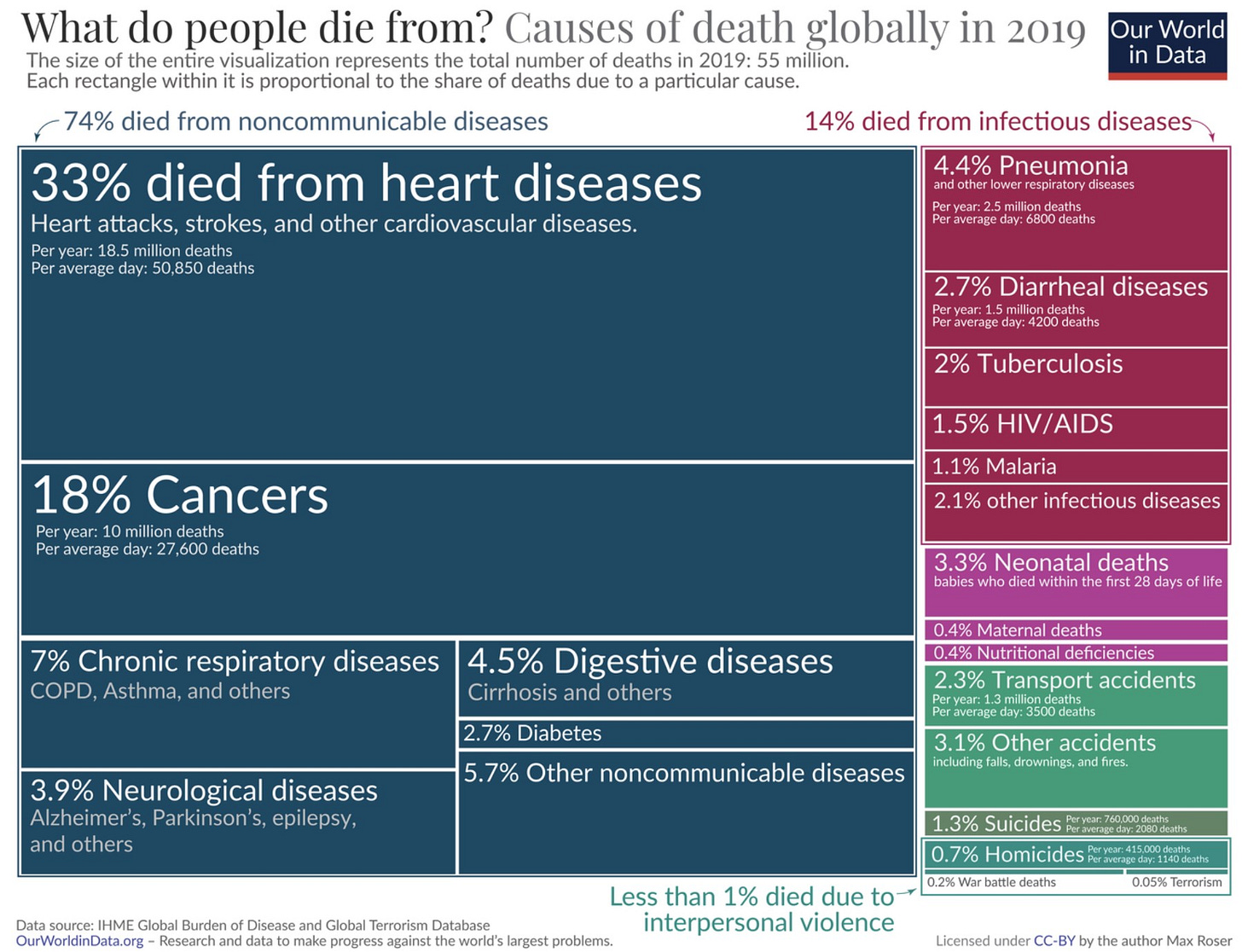

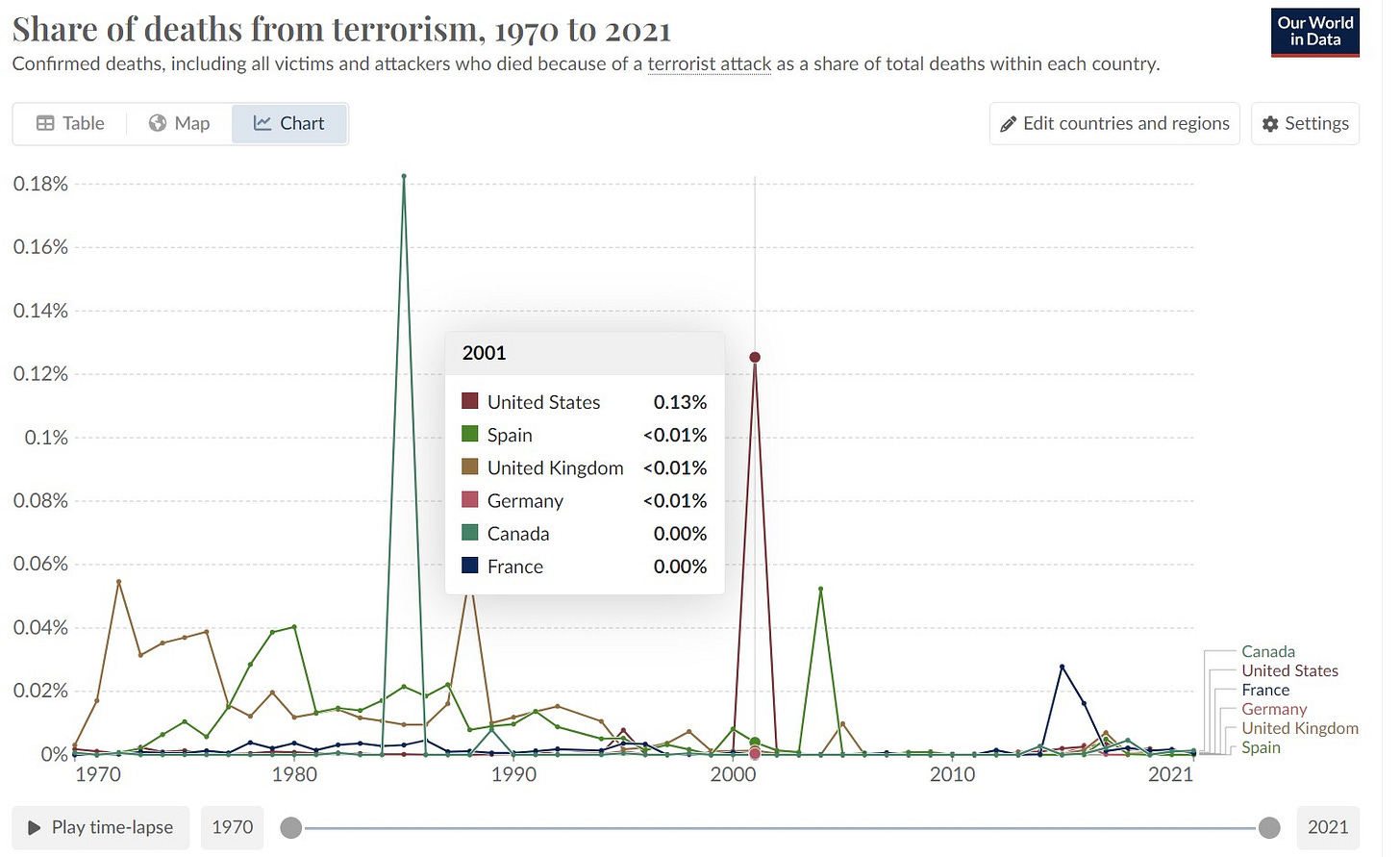

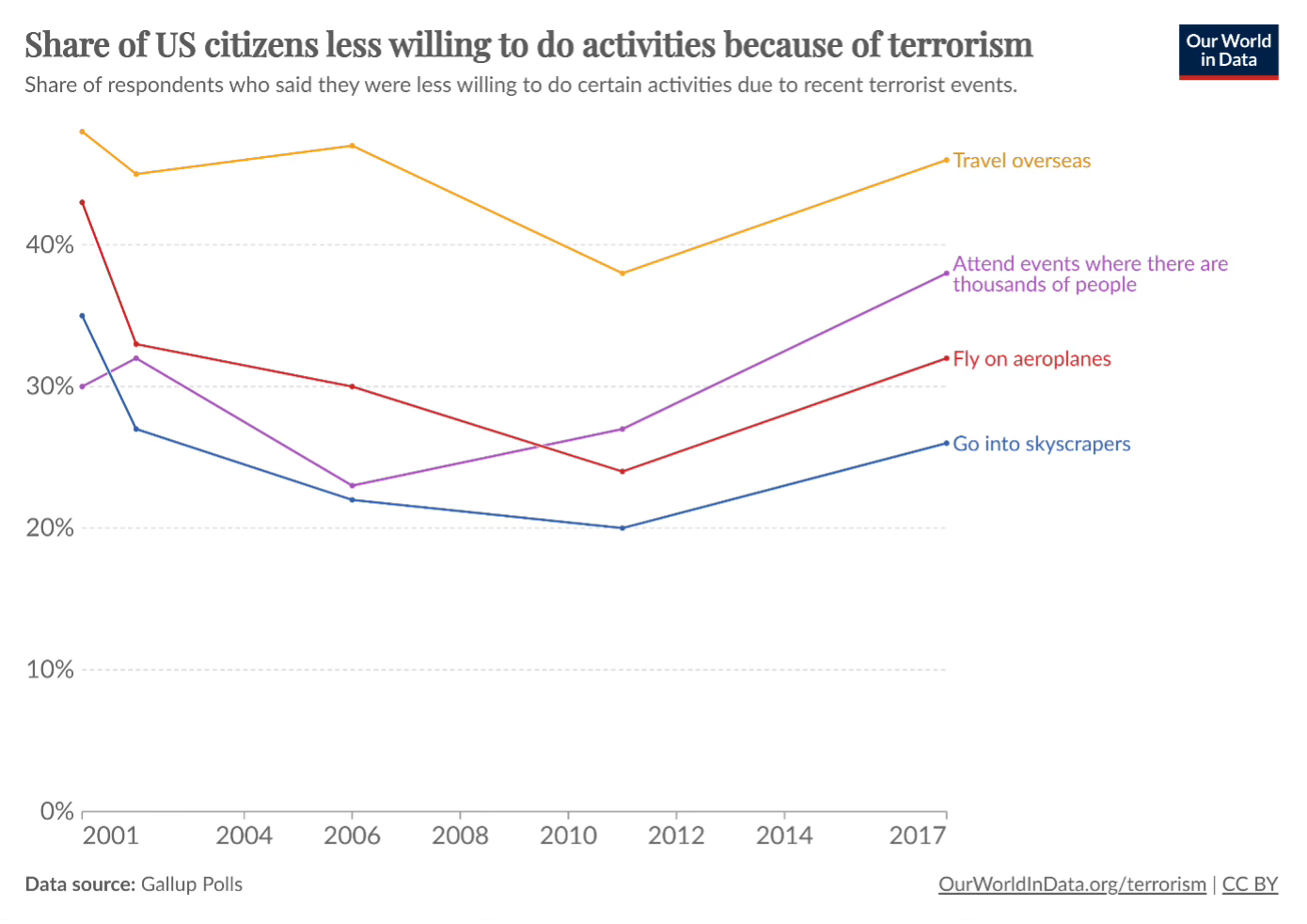
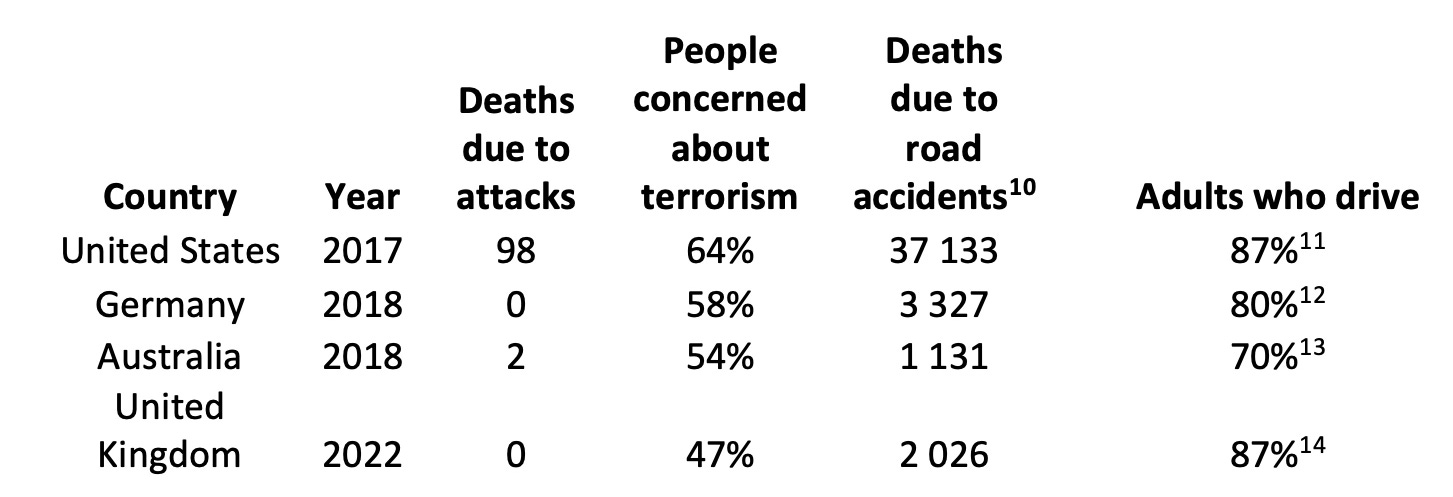

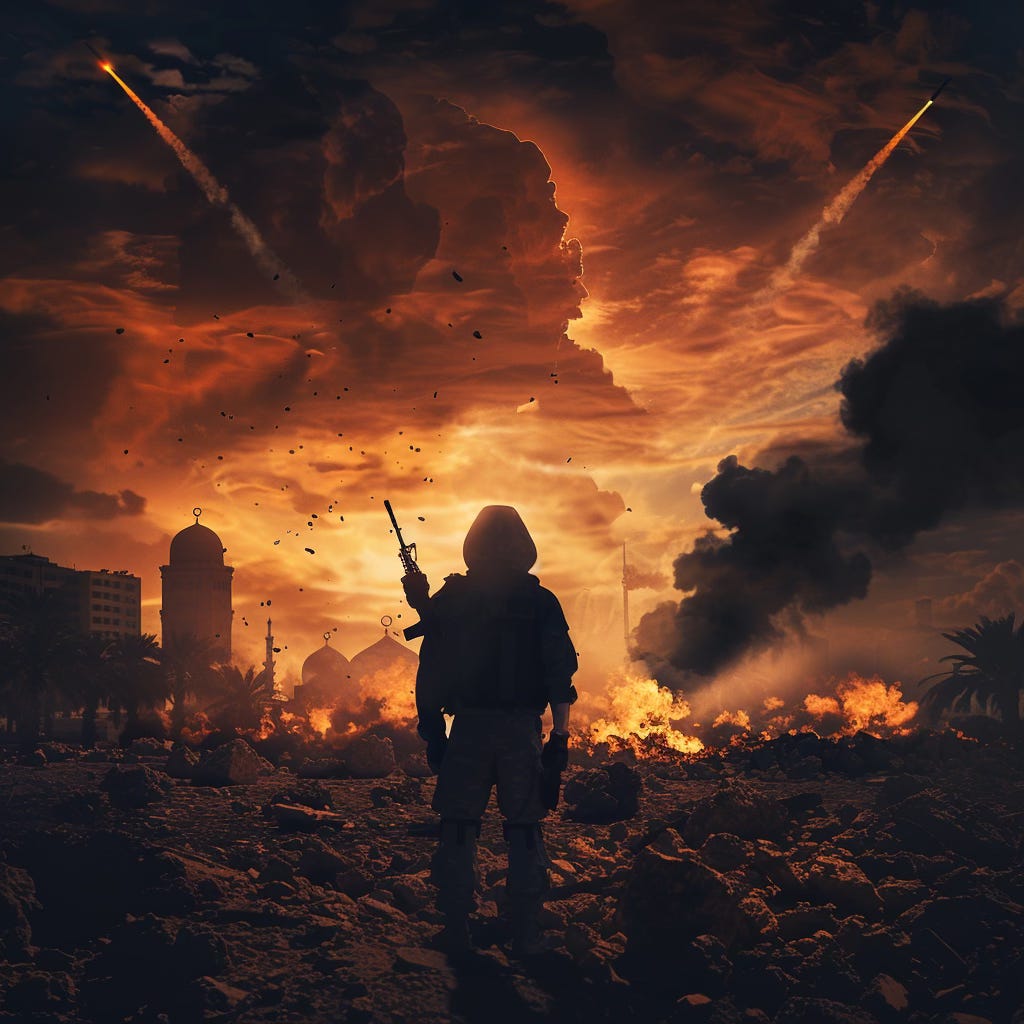


Quo bono from the terrorist attacks and the massive over reaction by the state attacked? Mostly the DS - the Military-industrial complex selling trillions in arms on new wars, and the Inteligence services with new laws to spy on their own citizens. The MSM gets a bunch of extra clicks about the wars that follow.